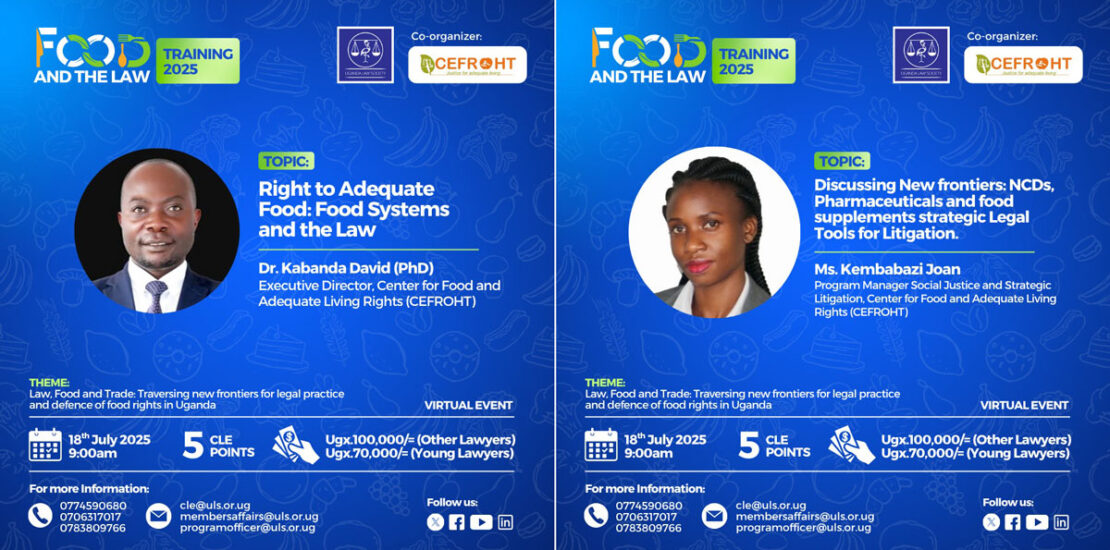UNCC-FOPWL led by CEFROHT Champions Legal Reform to Combat Unhealthy Food Marketing, Protect the Right to Adequate Food for Ugandans
- July 17, 2025
- Posted by: CEFROHT Reporter
- Categories: Advocacy, News Updates

KAMPALA, UGANDA – The Uganda National CSO Coalition on Front of Pack Warning Labelling (UNCC-FOPWL) led by the Center for Food and Adequate living Rights (CEFROHT) today issued a warning regarding the unregulated marketing of unhealthy foods to Ugandan children and the absence of key legal frameworks governing the right to adequate food in Uganda. This regulatory vacuum poses a severe threat to public health and violates fundamental human rights.
According to the World Health Organization (NCD Uganda Country Profile 2018), Non-Communicable Diseases (NCDs) account for 35% of all deaths in Uganda. Alarmingly, 90% of Ugandan children consume unhealthy diets. Currently, Uganda lacks clear and evidence-based regulatory frameworks, like policies, strategies, models, and regulations to oversee food trade or alert the public to excessive levels of critical nutrients like sugar, salt, and trans fats in food and sugar-sweetened beverages. Furthermore, the key sectors of Non-Communicable Diseases and Pharmaceuticals remain largely unexplored frontiers for legal practice within the country.
Compounding this crisis, no Ugandan law or policy prohibits the food sector from promoting, advertising, or marketing unhealthy diets specifically to children. This absence makes Uganda a hub for foods high in fat, salt, sugar, and trans fats, with no restrictions on marketing tactics targeting vulnerable populations and no fiscal measures, such as taxes, aimed at encouraging healthier dietary choices.
“Uganda is at crossroads,” stated David Kabanda, Executive Director of CEFROHT. “The aggressive marketing of unhealthy foods to our children, coupled with the complete lack of regulation on harmful nutrients, is a ticking time bomb for public health. Lawyers possess a constitutional, professional, and ethical duty to champion human rights, including the fundamental rights to health and adequate food. We can no longer afford regulatory inaction that sacrifices the well-being of future generations.”
This unregulated environment constitutes a significant breach of Uganda’s legal obligations. Domestically, it violates key provisions of the Constitution (Articles 20, 24, and 34), the Children’s Act, and the Public Health Act. Internationally, Uganda is bound by treaties including the International Covenant on Economic, Social and Cultural Rights, the UN Convention on the Rights of the Child, and the African Charter on Human and Peoples’ Rights, all of which mandate deliberate state action to ensure access to safe and nutritious food, particularly for children.
Without a Nutrient Profiling Model (NPM), there are no clear limits on how much sugar, salt, or fat is too much for human consumption. An NPM sets the limits for these harmful ingredients and helps policy makers formulate policies like front-of-pack warning labels on food packages and restrictions of marketing of unhealthy food to children and adolescents. Lawyers are uniquely positioned to confront this crisis by shaping policy and regulation, challenging industry interference, and demanding government accountability.
Through strategic public interest litigation, robust legislative advocacy, and vigilant regulatory oversight, the legal profession can drive the adoption of a robust NPM, support the implementation of Front-of-Pack Warning Labelling (FOPWL), and advocate for stringent restrictions on the marketing of unhealthy foods to children. Their expertise is indispensable in closing regulatory gaps and aligning national policies with international human rights standards.
A critical step in this direction is the recent lawyers’ petition submitted to the Ministry of Justice and Constitutional Affairs. This petition demands the urgent adoption of an evidence-based NPM and signals the legal community’s readiness to pursue further legal action should meaningful progress stall.
“Litigation is a powerful tool to enforce state obligations and protect vulnerable populations,” emphasized Kembabazi Joan, Program Head, Social Justice and Strategic Litigation Center at CEFROHT. “The petition to the Ministry is a strategic legal intervention. It emphasizes our commitment to using the courts to compel action where policy inertia persists, ensuring the government fulfils its duty to safeguard citizens’ right to health and adequate food, especially for our children.”
The UNCC-FOPWL and the Uganda Law Society are spearheading this specialized training to empower legal professionals in this fight. The primary objective is to build the capacity of lawyers to influence food policy reform effectively. This includes deepening their understanding of the legal implications of NPM and FOPWL, exploring the Non-Communicable Diseases and Pharmaceuticals sectors as vital new frontiers for legal practice, and mobilizing them to advocate forcefully for the adoption of an evidence-based Nutrient Profiling Model in Uganda.
About CEFROHT:
The Center for Food and Adequate Living Rights (CEFROHT) is a Ugandan non-profit organization dedicated to promoting and protecting the human right to adequate food and living through legal advocacy, research, strategic litigation, capacity building, and policy engagement.
Media Contact:
Naisanga Sarah
Program Manager, Advocacy and Partnership
Center for Food and Adequate Living Rights (CEFROHT)
